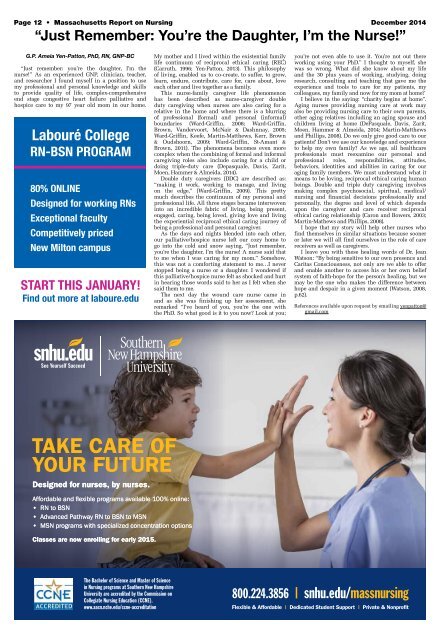Massachusetts Report on Nursing - December 2014
You also want an ePaper? Increase the reach of your titles
YUMPU automatically turns print PDFs into web optimized ePapers that Google loves.
Page 12 • <str<strong>on</strong>g>Massachusetts</str<strong>on</strong>g> <str<strong>on</strong>g>Report</str<strong>on</strong>g> <strong>on</strong> <strong>Nursing</strong> <strong>December</strong> <strong>2014</strong><br />
“Just Remember: You’re the Daughter, I’m the Nurse!”<br />
G.P. Ameia Yen-Patt<strong>on</strong>, PhD, RN, GNP-BC<br />
“Just remember: you’re the daughter, I’m the<br />
nurse!” As an experienced GNP, clinician, teacher,<br />
and researcher I found myself in a positi<strong>on</strong> to use<br />
my professi<strong>on</strong>al and pers<strong>on</strong>al knowledge and skills<br />
to provide quality of life, complex-comprehensive<br />
end stage c<strong>on</strong>gestive heart failure palliative and<br />
hospice care to my 97 year old mom in our home.<br />
My mother and I lived within the existential family<br />
life c<strong>on</strong>tinuum of reciprocal ethical caring (REC)<br />
(Carruth, 1996; Yen-Patt<strong>on</strong>, 2013). This philosophy<br />
of living, enabled us to co-create, to suffer, to grow,<br />
learn, endure, c<strong>on</strong>tribute, care for, care about, love<br />
each other and live together as a family.<br />
This nurse-family caregiver life phenomen<strong>on</strong><br />
has been described as nurse-caregiver double<br />
duty caregiving when nurses are also caring for a<br />
relative in the home and where there is a blurring<br />
of professi<strong>on</strong>al (formal) and pers<strong>on</strong>al (informal)<br />
boundaries (Ward-Griffin, 2008; Ward-Griffin,<br />
Brown, Vandervoort, McNair & Dashnnay, 2005;<br />
Ward-Griffin, Keefe, Martin-Matthews, Kerr, Brown<br />
& Oudshoorn, 2009; Ward-Griffin, St-Amant &<br />
Brown, 2011). The phenomena becomes even more<br />
complex when the combining of formal and informal<br />
caregiving roles also include caring for a child or<br />
doing triple-duty care (Depasquale, Davis, Zarit,<br />
Moen, Hammer & Almeida, <strong>2014</strong>).<br />
Double duty caregivers (DDC) are described as:<br />
“making it work, working to manage, and living<br />
<strong>on</strong> the edge,” (Ward-Griffin, 2009). This pretty<br />
much describes the c<strong>on</strong>tinuum of my pers<strong>on</strong>al and<br />
professi<strong>on</strong>al life. All three stages became interwoven<br />
into an incredible fabric of living, being present,<br />
engaged, caring, being loved, giving love and living<br />
the experiential reciprocal ethical caring journey of<br />
being a professi<strong>on</strong>al and pers<strong>on</strong>al caregiver.<br />
As the days and nights blended into each other,<br />
our palliative/hospice nurse left our cozy home to<br />
go into the cold and snow saying, “Just remember,<br />
you’re the daughter, I’m the nurse! A nurse said that<br />
to me when I was caring for my mom.” Somehow,<br />
this was not a comforting statement to me…I never<br />
stopped being a nurse or a daughter. I w<strong>on</strong>dered if<br />
this palliative/hospice nurse felt as shocked and hurt<br />
in hearing those words said to her as I felt when she<br />
said them to me.<br />
The next day the wound care nurse came in<br />
and as she was finishing up her assessment, she<br />
remarked “I’ve heard of you, you’re the <strong>on</strong>e with<br />
the PhD. So what good is it to you now? Look at you;<br />
you’re not even able to use it. You’re not out there<br />
working using your PhD.” I thought to myself, she<br />
was so wr<strong>on</strong>g. What did she know about my life<br />
and the 30 plus years of working, studying, doing<br />
research, c<strong>on</strong>sulting and teaching that gave me the<br />
experience and tools to care for my patients, my<br />
colleagues, my family and now for my mom at home?<br />
I believe in the saying: “charity begins at home”.<br />
Aging nurses providing nursing care at work may<br />
also be providing nursing care to their own parents,<br />
other aging relatives including an aging spouse and<br />
children living at home (DePasquale, Davis, Zarit,<br />
Moen, Hammer & Almeida, <strong>2014</strong>; Martin-Matthews<br />
and Phillips, 2008). Do we <strong>on</strong>ly give good care to our<br />
patients? D<strong>on</strong>’t we use our knowledge and experience<br />
to help my own family? As we age, all healthcare<br />
professi<strong>on</strong>als must reexamine our pers<strong>on</strong>al and<br />
professi<strong>on</strong>al roles, resp<strong>on</strong>sibilities, attitudes,<br />
behaviors, identities and abilities in caring for our<br />
aging family members. We must understand what it<br />
means to be loving, reciprocal ethical caring human<br />
beings. Double and triple duty caregiving involves<br />
making complex psychosocial, spiritual, medical/<br />
nursing and financial decisi<strong>on</strong>s professi<strong>on</strong>ally and<br />
pers<strong>on</strong>ally, the degree and level of which depends<br />
up<strong>on</strong> the caregiver and care receiver reciprocal<br />
ethical caring relati<strong>on</strong>ship (Car<strong>on</strong> and Bowers, 2003;<br />
Martin-Mathews and Phillips, 2008).<br />
I hope that my story will help other nurses who<br />
find themselves in similar situati<strong>on</strong>s because so<strong>on</strong>er<br />
or later we will all find ourselves in the role of care<br />
receivers as well as caregivers.<br />
I leave you with these healing words of Dr. Jean<br />
Wats<strong>on</strong>: “By being sensitive to our own presence and<br />
Caritas C<strong>on</strong>sciousness, not <strong>on</strong>ly are we able to offer<br />
and enable another to access his or her own belief<br />
system of faith-hope for the pers<strong>on</strong>’s healing, but we<br />
may be the <strong>on</strong>e who makes the difference between<br />
hope and despair in a given moment (Wats<strong>on</strong>, 2008,<br />
p.62).<br />
References available up<strong>on</strong> request by emailing yenpatt<strong>on</strong>@<br />
gmail.com

















